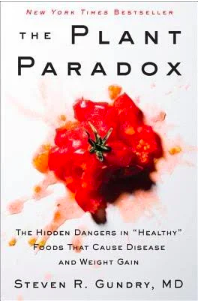
I get it, to sell a book you need to make some pretty wild claims, but the arrogance was a bit much for me. Statements like ‘no one has put it all together before’ really bug me. I guess he never read any of Dr. Peter D’Adamo’s books or research that has been widely available for the last 20 years. I don’t agree with all of Dr. D’Adamo’s work but I just don’t believe the claim that Dr. Gundry is the first person to figure out that there might be a connection with lectins and health. I picked a few other sweeping claims that I don’t agree with:
- “If you have ever experienced brain fog, thank lectins”
- Well, I can think of a few more reasons you may have brain fog: lack of sleep, stress, hormonal changes, blood sugar imbalances, and dehydration to name a few.
- A runny nose from eating spicy foods is due to lectins.
- I firmly disagree with this claim. Capsaicin and allyl isothiocyanate are compounds found in ‘spicy’ foods and they irritate mucous membranes. Head of pepper spray? That is made from capsaicin, not lectins.
- Europeans are slimmer and generally healthier than Americans because their produce is naturally ripened unlike produce in the US that is artificially ripened with ethelyne oxide.
- This would take a whole blog post to rebut I will just say that the list of how the US is different from Europe is very long. Consider Europe’s stringent regulation on chemicals, their more active lifestyle, better work culture, and higher quality of food in general. It’s a sweeping generalization to say the way their produce is ripened is the cause of the BMI disparity between Europe and the US.
- Vitamin D toxicity doesn’t exist.
- I will agree with him that I too haven't’ seen vitamin D toxicity in practice, but that does not mean it doesn’t exist! It also doesn’t mean that you should recommend people take 10,000 IU of vitamin D daily (his recommendation) especially when he didn’t talk about balancing vitamin D3 with vitamin K2 intake.
His fixation on ‘weight loss’ turned me off. He mentions weight in the first sentence of his book and continues to discuss trying to ‘lose weight’ as synonymous with health. As a proponent of health at every size this gets under my skin.
Let’s move on to the main content- the concept that lectins in foods are bad for all of us. I am not a fan of one size fits all for ways of eating so I should say that up front. Dr. Gundry speaks about lectins as if they are animate and out to damage our bodies- “the first mission of lectins is to pry apart what are called the tight junctions between cells in the mucosal wall lining your intestine”. It is true that lectins are made by plants as a defence mechanism against being eaten by predators but that does not mean that lectins are conspiring to kill us. According to MayoClinic.org “Lectins are naturally occurring proteins that are found in most plants. Some foods that contain higher amounts of lectins include beans, peanuts, lentils, tomatoes, potatoes, eggplant, fruits, and wheat and other grains.”1 Dr. Gundry argues that foods from the Americas have been in our diet for the shortest amount of time so those foods such as nightshades and squash are particularly problematic because humans just haven’t had time to adjust to eating them. It’s an interesting argument but I just don’t think a low lectin diet is the answer to the multitudes of conditions he lists in his book. Dr. Gundry states if you are lectin sensitive, the negative impact outweighs any positive impact. Lectins have anti-cancer properties. I took the following paragraph from a research paper on lectins and digestive cancers:
“Phase III studies of the effect of plant lectins in cancer patients have shown favorable effects. The ability to induce cell death in a selective manner is a desirable attribute in anticancer therapy and, paradoxically, a trait most of the current chemotherapeutics lack but which lectins have shown. Hence, the growing interest in the study of the activity of plant lectins is due to the biological effects they exert on cancer cells, from identification of tumors to antitumor activity and, additionally, decreased side effects caused by chemotherapeutics.” 2
I suspect the truth about lectins is more complicated than just- lectins damage our bodies, don’t eat them. I have seen that a small number of patients with joint pain respond well to a low lectin diet but I have also seen hundreds of patients with conditions he lists in his book respond well to other dietary changes that are more moderate and inclusive of a variety of foods. His book did not sway my belief that we must approach every patient as a unique individual and what works well for one person’s diet might not work well for another person.
A short summary of my likes and dislikes of his food plan:
Like:
- Unless you have cancer or a neurological disease he does recommend reintroducing lectin foods when prepared properly. This includes using a pressure cooker for beans and removing the skin and seeds of many foods (pepper, tomatoes, squash to name a few). I advocate eating the widest variety of foods possible so I appreciate that he encourages most patients to expand their food options after an elimination period.
- He focuses on high quality foods and emphasizes that the majority of food be vegetables.
- He discusses intermittent fasting and the health benefits.
Dislike:
- In Phase 1 he recommends strong laxatives and antimicrobial herbs as a way to help rebalance the microbiome. Antimicrobial herbs damage the microbiome and should only be used when necessary.
- The diet is very limiting. By removing beans, nightshades, squash, certain nuts and seeds and significantly reducing animal protein there isn’t much left to eat! See the safe food list here.
- He supports a high fat diet without the warning that there is a percentage of the population who’s cholesterol rises significantly on a high fat diet. I was surprised at this omission considering his background in cardiology.
He does talk about other issues outside of lectins, some of which I agree with and I listed those points below:
- When we find foods that disagree with us, we try to cover it up (nexium, ibuprofen) instead of changing our diet and this will have long term consequences.
- We should absolutely not be feeding animals foods that are not part their natural diet (cows being fed corn and soy for example).
- GMOs are dangerous.
- Our microbiome is critical for our overall health and wellbeing.
- Antibiotics are destroying our microbiome.
- Changes in farming techniques to move away from local, in season produce has negative impacts on our health.
- Chapter 4 ‘Know Thy Enemy’ is all about other agents that damage our health such as endocrine disruptors, herbicides, artificial sweeteners, preservatives and more. I appreciate a conventional provider coming out against the toxic substances that have been normalized in our society.
I was surprised about his anti-animal protein stance in the book. I am disappointed with the two studies he cited to back up his claims about the dangers of red meat. Here is an excerpt from one of them:
“By examining the per capita availability of macronutrients and the major food groups for 170 countries we are able to identify that countries with dietary patterns that are higher in meat have greater rates of obesity and overweight and higher mean BMI. Considering the findings of adverse effect of obesity on the risk of other chronic diseases revealed by other studies as well as the environmental impact of meat production, the country authorities may advise people not to adopt a high-meat diet for long-term healthy weight management.”3
Countries with higher meat availability are also countries that are more developed and are raising animals in ways that contribute to poor health such as feeding them corn and soy, using high amounts of antibiotics in their feed and other questionable practices. The second study he cites as reason for avoiding red meat used two cohorts. One cohort was predominantly white males living in all 50 US states and the other cohort was women living in the US. In the results they state “Men and women with higher intake of red meat were less likely to be physically active, and more likely to be current smokers, drink alcohol and have higher BMI. In addition, a higher red meat intake was associated with a higher intake of total energy, but lower intakes of whole grain, fruit and vegetables.”4 So I find it hard to use this study to claim red meat is the problem.
I am not arguing we should be eating large amounts of red meat daily. My point is that we shouldn’t use this research to argue that red meat is bad for our health. Especially when the majority of the people in this study were likely eating conventionally raised red meat. That said, I did learn something completely new from this book. N-Glycolylneuraminic acid (Neu5Gc) is a sialic acid widely distributed in animal tissue and not produced in the human body. Red meat, some fish and some dairy are the dietary sources of Neu5Gc. Neu5Gc is found in high concentrations in human cancers and appears to set off our immune system. I read through some articles in PubMed and found that there is some data indicating Neu5Gc may be part of the reason that diets high in red meat consistently correlate with higher incidence of cancer. Dr. Gundry talks about this theory as if it has been proven and that does not seem to be the case. It’s interesting data and the most compelling argument against red meat I have seen because Neu5Gc would be just as prevalent in pasture raised meat as conventionally raised meat but I don’t think the truth has been flushed out yet.
In summary, I disagree with Dr. Gundry’s claims that a low lectin diet is a panacea. I think using a low lectin diet in select patients as part of a GI healing protocol is useful but so are many other strategies that holistic providers have been using for decades.
References:
- https://newsnetwork.mayoclinic.org/discussion/mayo-clinic-q-and-a-what-are-dietary-lectins-and-should-you-avoid-eating-them/
- Estrada-Martínez, Moreno-Celis, Cervantes-Jiménez et al. Plant Lectins as Medical Tools Against Digestive System Cancers. Int J Mol Sci. 2017 Jul; 18(7): 1403 (PMID: 28671623
- https://doi.org/10.1186/s40795-016-0063-9
- Pan, Sun, Bernstein, Shulze et al. Red Meat Consumption and Mortality: Results from Two Prospective Cohort Studies. Arch Intern Med. 2012 Apr 9; 172(7): 555–563. PMID 22412075
| Dr. Barrett believes that effective healthcare is a collaborative partnership between the patient and the provider. She wants to break down the hierarchy that often exists in healthcare systems. She strives to build strong relations with my patients and inspire them to make lasting changes in their health. Dr.Barrett's goal is to dig into the root cause of your conditions and help initiate whole body healing. She is an avid student of holistic healthcare and constantly brings new information into my practice. No two people are the same, and she creates personalized treatment plans that reflect her patients unique health care needs. Dr. Barrett has been in practice since 2012. Learn more about Dr. Barrett by visiting her professional website. |


 RSS Feed
RSS Feed